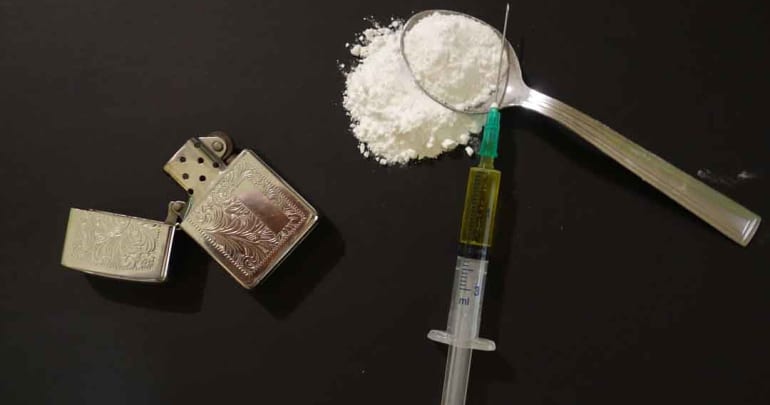More than half a million people, about 626,000 people total, reported struggling with a heroin addiction in 2016. This means that over half of the 948,000 people who reported using heroin that year are dependent upon the drug. Rates of use have climbed each year since 2007 and show no signs of stopping soon.
The mortality rate of overall opioid use, including heroin, is also jarring. Opioids and opiates claimed the lives of 49,068 people in 2017. In other words, an average of 134 people died of an opioid overdose every single day of the year. The effects of the opioid crisis become clearer every year.

As the rates of heroin addiction and continue rising, it’s important to understand the effects of the drug. Many people commonly agree that heroin is one of the most difficult drugs to quit using. It takes an extreme toll on the lives of those who use it, as well as those who care about them.
Why is heroin such a drastic problem in the United States today? What causes people to use such a dangerous and deadly drug? What are the effects of heroin addiction and how do you know what to look for? Continue reading to find out more about the heavy impact of this opiate drug.
Understanding Heroin Addiction
The majority of the time, heroin isn’t the first drug people start out using. It’s not necessarily even one that people intentionally look for. More often than not, people who use heroin started off using painkillers. Roughly 80 percent of heroin users today report initially using prescription painkillers first, usually on a non medical basis.
The effects of the drug on your brain make heroin addiction such a difficult habit to quit. The reason is twofold: you become both physically and psychologically dependent on it. Some former heroin addicts explain that the rush of complete calmness and euphoria that comes with a heroin high is impossible to fully describe; it can only be felt.
Additionally, heroin interacts with the part of your brain that controls your perception of pain, your opioid receptors. If you regularly introduce a drug that limits your ability to feel pain, quitting using it produces essentially the opposite effect. This makes coming off of heroin or other opiates incredibly painful.
So what are the other effects of heroin? How do you know what to look for if you worry someone you love struggles with a heroin addiction? There are a few different things to look for, some that take place on a short-term basis and others that have a long-term impact.

Heroin addiction continues claiming the lives of thousands of people across the United States every year. The overdose rates show no sign of stopping soon so what can you do?
More infoShort-Term Effects of Heroin Addiction
If you’re worried someone you know might struggle with heroin addiction, look for these short-term effects.
1. Constricted pupils.
Check their pupils. Heroin constricts a user’s pupils to noticeably tiny pinpricks. Their pupils will stay small even in rooms that are dimly lit.
2. Slowed or slurred speech.
Heroin affects cognitive function which causes users to speak slowly or slur their words. Sometimes it sounds like their tongue takes up too much space, making their speech sound “thick.”
3. “Nodding out.”
Nodding out, or going “on the nod,” refers to the repeated transition between consciousness and semi-consciousness. Someone who is high on heroin switches between stages of alertness and their head droops down as they slip into semi-consciousness.
4. Track marks.
People who inject heroin intravenously end up with visible track marks, usually on their arms, biceps, or wrists. They are small, unhealed wounds left behind after injecting with a needle. Repeatedly injecting into the same area leads to noticeable scarring or discolored spots.
5. Overdose.
This may seem obvious but as overdose rates rise you might find someone overdosed before ever realizing they struggle with heroin addiction. Overdose is easily the most obvious sign of abuse.

Heroin is one of the most dangerous drugs available in the United States today. It’s a highly addictive substance that traps users in its grip and does all it can to not let go.
More infoLong-Term Effects of Heroin Addiction
Using heroin for months or years at a time leads to an entirely different set of problems, some that are irreversible.
1. Abscesses.
Abscesses are pockets of skin filled with pus that result from injecting with dirty needles. If the abscess becomes infected it greatly increases your risk of other health problems.
2. Collapsed veins.
Repeatedly injecting at the same site may cause your vein to collapse. Collapsed veins happen when a user damages their vein linings to the point that blood clots and the sides of the vein heal together. You can usually never use a collapsed vein again.
3. Mental disorders.
The drug rewires the brain and a person’s ability to cope with the world on their own, leading to a number of mental health problems, such as depression or anxiety.
4. Withdrawal symptoms.
If someone uses heroin for a long period of time, their body becomes dependent on it. When they stop using the drug, they experience physical and psychological reactions called withdrawal symptoms. Withdrawals are physically painful and psychologically overwhelming.
5. Death.
When someone isn’t able to quit using heroin, death is often the drug’s final effect. Recently, the odds of dying of an accidental overdose became greater than the chances of dying in a car accident. If a person doesn’t seek help for their heroin addiction, the drug usually ends up with the last say.
Getting Help with Getting Clean
Heroin addiction doesn’t have to be the end of the road. There are ways to escape the trap of substance dependence through the help of addiction treatment. Facilities like Hawaii Island Recovery specialize in showing people a way out and away from addiction. If someone you love struggles with drug use, call us today at 877-721-3556 to learn more about the options we offer.
 Hawaii Island Recovery
Hawaii Island Recovery 










